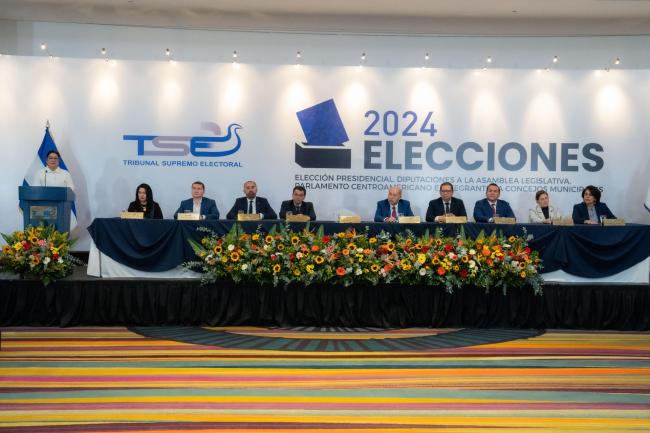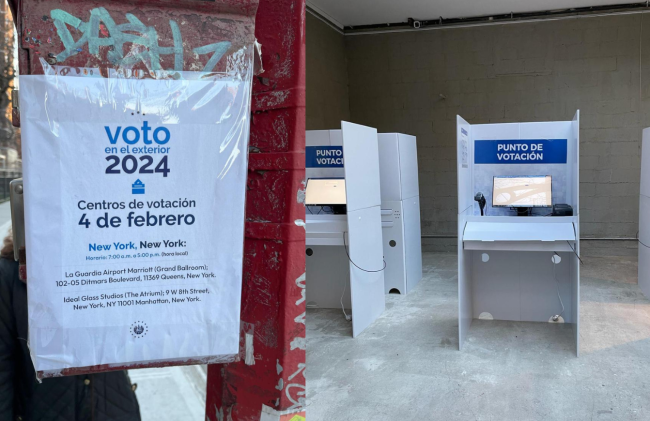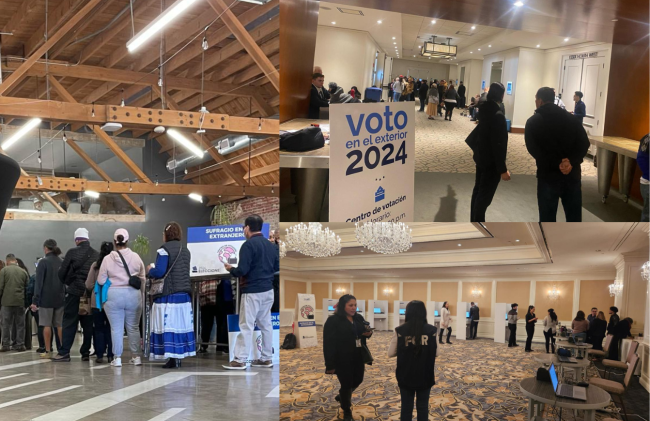
On February 4, tens of thousands of Salvadorans in the United States and other countries made their way to convention centers, hotels, and consulates to vote in the election that would return President Nayib Bukele to the top office and hand 90 percent of legislative seats to his Nuevas Ideas party.
For the first time since El Salvador introduced voting abroad 10 years ago, Salvadorans in the diaspora, who comprise about 25 percent of the country’s total population, were invited to vote electronically. A record 330,232 Salvadorans abroad cast their ballots, 87 times more than the 3,808 in the last election. Despite challenges, these voters had a definitive influence. In an election that sent Bukele to an unconstitutional second term in office with 85 percent of the vote, a stunning 98 percent of voters abroad sided with the authoritarian populist.
The vote abroad, however, was riddled with technical and logistical challenges. Many were unfamiliar with how to use the hastily installed electronic voting machines, and poll workers often physically clicked through and cast votes for confused voters. In some locations, voters waited hours only to be turned away, despite having valid documents. In Silver Springs, Maryland, the police were called after hundreds of disappointed voters were locked out when polls closed at 5:00 pm and began protesting.
Salvadorans whose identification document showed a U.S. address were eligible to cast their votes online from their cell phone or computer during the month preceding the election. This system opened the door for family members or election workers to “assist” voters, often leaving voter preference and privacy behind.
Despite his widespread popularity, Bukele left nothing to chance. Over the last five years, he and his Nuevas Ideas party have methodically usurped functions of the Supreme Electoral Tribunal (TSE), packed the Supreme Court with loyalists, and gained a supermajority in the Legislative Assembly. Together these bodies enabled his run for reelection and consolidated legislative and municipal power in fewer hands by redrawing the electoral map. Bukele illegally denied opposition parties public campaign funding, and he has threatened opposition media while building up his own government-controlled TV, print media, and social media bots.

After February 4, as a ballot-by-ballot count revealed irregularities, four opposition parties and many civil society organizations called for a total annulment of the election results. A week after the election, four of the five alternate TSE magistrates sent a letter to their colleagues expressing concerns about decisions in the recount process that had not been made “lawfully or correctly.”
While it is clear that Bukele enjoys high approval, support for his party is much less guaranteed. According to an analysis by the organization Acción Ciudadana, had Bukele’s allies not redrawn the electoral map, Nuevas Ideas would have won 71 percent of the country’s legislative seats rather than the 90 percent they will now control, and eight political parties rather than five would have gained seats in the Assembly.
One chess piece in Bukele's game to consolidate power is located far from the daily realities in El Salvador and heavily influenced by the president’s impressive flair for social media: the expansion of voting abroad.
Cultivating a Voting Bloc Abroad
Since the 1980s, millions of Salvadorans have been forced to migrate due to civil war, gang violence, and ongoing poverty and economic precarity. Despite being the smallest country in continental America, El Salvador is second only to Mexico as a country of origin for undocumented migrants in the United States. Many migrants have now lived in the United States for longer than they lived in El Salvador.
Enter Nayib Bukele. With a background in public relations, Bukele has successfully generated an image of El Salvador on the international stage where violent crime is non-existent and public works projects—like the tourist-friendly Surf City and the high-tech National Library—are bringing about a rebirth of the country. These token projects and the reduction of street-level gang activity—gains promoted by a savvy social media game plan and an army of state-funded pro-Bukele internet trolls—have transformed Bukele into a near messianic figure who has overcome what he calls “dark forces” in order to “get our country back.”
Salvadorans abroad do not experience first-hand the daily reality of rising food prices, cuts to health care and education, and increasing poverty rates that voters inside the country have navigated under Bukele. They are also not at risk of being swept up in Bukele’s dragnet approaches to public safety, which have resulted in tens of thousands of innocent people facing incarceration, torture, and dehumanizing prison conditions.
While these factors haven’t eroded support for the president in-country either, Bukele’s sight is set not just on this election, where his reelection was practically guaranteed. He hopes to continue to call on this army of voters abroad in future elections. After years of being cast in the U.S. media as gang members from a “sh**hole country,” many Salvadorans in the diaspora are finally proud to support the self-proclaimed “world’s coolest dictator,” his futuristic (if abandoned) Bitcoin City, and his Instagram-friendly tourism projects.
The Special Law for Voting Abroad
In November 2022, the Legislative Assembly approved the Special Law for Voting Abroad, replacing a previous law passed in 2013. The new law introduced mechanisms to activate this voting bloc to the maximum possible extent in favor of Bukele.
Critiques of the law boil down to several key elements. First, the vote abroad was taken out of TSE control and put into the hands of a Spanish corporation, INDRA, which was awarded a $41.1 million no-bid contract to carry out election logistics—in violation of Salvadoran public procurement law.
According to Ruth López, an attorney with the Salvadoran human rights organization Cristosal, “The Tribunal has lost control of the election in the exterior… by privatizing it, by leaving a corporation in charge… without the Tribunal itself having any participation outside of paying out the money.”
The use of technology designed by a private corporation has also raised concerns about transparency, exacerbated by the government’s refusal to hand over source codes that would allow an external actor like a university, NGO, or foreign oversight body to verify the validity of INDRA’s results. As widespread failures in facial recognition features were reported, INDRA refused to hand over audit reports of tests done prior to the vote. In the end, the facial recognition process was scrapped altogether for in-person voting, and no information has been released about its accuracy with online voting.
Julio Olivo, one of the five TSE magistrates, said that a vote count executed single-handedly by a private company “would lack legitimacy, complicate a public audit, and put in question the validity of the results.”
Second, by including the passport as a valid voting document, the law made it impossible to create an accurate voter registry and to verify voter identity. While the constitution requires that a voter registry be made available to political parties 90 days before the election, according to Olivo, the Special Law “introduces a core problem of prohibiting [the registry’s] creation.”
During in-country elections, Salvadorans’ national ID card is the only document that permits voting, and each voting table contains a list of up to 700 voters who are authorized to vote at that table. Results are then tabulated and transmitted table by table. In the vote abroad, the lack of control and identity verification meant that poll workers “didn’t have the capacity to know how many people were going to be present and ensure logistically that all of them would be able to exercise their suffrage,” says López.

In addition, ambiguity in the Special Law left room for the Immigration Ministry to make what López calls “arbitrary” decisions about voting eligibility, such as deciding that expired passports would also be accepted as a valid form of identification.
Many movement organizations anticipated the challenges. According to Francisco Parada from the grassroots Bloque de Resistencia y Rebeldía Popular, the group expected that the Special Law and the changes pertaining to identity documents “were going to generate irregularities and a lack of information.” The result was “disarray,” he says. “Credibility doesn’t exist in relation to the data that has been provided. Yes, we saw that many Salvadorans showed up to vote, and we all have that right, but this doesn’t prove that the data that the TSE has provided is accurate.”
Third, the Special Law controversially assigns all Salvadorans whose national ID card lists an address abroad, or who vote abroad with a passport, to the department of San Salvador. This means that rather than being assigned to legislative assembly races in their departments of origin, these voters poured an additional 214,642 ballots into the assembly race in San Salvador, comprising 20 percent of the total votes in that department. As López highlights, this “violates the rights of these Salvadorans to vote for the people that represent the territories where they have roots.” López believes the controversial decision was made “with one single objective from the governing party, which is to obtain a greater number of seats in San Salvador,” a department where the party may have feared its power was waning.
Indeed, whereas 96 percent of voters abroad supported Nuevas Ideas candidates, the party garnered 71 percent support from voters living in the department of San Salvador. The vote from abroad was vital to Nuevas Ideas’s securing 14 out of the department’s 16 legislative seats.
Jose Fidel Campos Sorto, a member of the opposition party Farabundo Martí National Liberation Front (FMLN) who has been living in the United States for 10 years, served as a party oversight monitor at the voting center in Boston. “Putting myself in their political shoes, they’re correct,” he said of Nuevas Ideas. “It’s a good moment for them to bring more support. It doesn’t matter to them that [Bukele’s] candidacy is unconstitutional. They have taken steps that opened him up to getting more support. This is the first time they have cracked the code of the vote abroad.”
Election Day Irregularities
By election day, Bukele and Nuevas Ideas seemed to have put in place a foolproof plan to win the election, consisting of favorable reforms, packing independent government agencies with party loyalists, and using state resources for campaigning while cutting off financing for the opposition. Now all it would take was the implementation.
A three-hour audio recording published by Salvadoran digital media outlet FOCOS revealed that voting site directors in at least nine cities were governing party operatives who just days before the election were instructed by Bukele’s chief of cabinet Carolina Recinos to take steps to guarantee a “massive vote” for Bukele. Her message urged them to put party preference above their responsibilities to the electoral authority.
In a preliminary report to the TSE on the vote abroad, international observers with the Center for Exchange and Solidarity (CIS) documented opposition parties and media being denied access to observe the voting process, voters being “helped” by Nuevas Ideas members who physically manipulated the voting screen on behalf of voters, at times misrepresenting the voter’s preference, and an overwhelming presence of Nuevas Ideas supporters carrying out various roles within voting centers.
CIS reports that approximately 75 percent of voters did not know how to use the new technology and requested assistance in voting, opening up opportunities for vote tampering.
Kevin Murray, a CIS observer in Boston, Massachusetts reported that most voters were confused by the technology, and many asked for help. As one voter expressed confusion about how to vote electronically, Murray says, “They sent him to people with no identification, who took him into the hallway, took his phone, and essentially voted for him on the phone. There were two guys assigned to do this throughout the day.”
At many sites, Salvadorans eligible to vote online arrived to cast ballots in person. They were intercepted by Nuevas Ideas members working at tents outside of voting sites to assist voters with accessing the online portal. According to observers, the disproportionate presence of Nuevas Ideas representatives on election day at all levels of the process created a conflation of the governing party with the government itself, where it appeared to some voters that there was no alternative.
Ana Roque, an FMLN member who has lived in the United States for 30 years and volunteered to oversee the election in Silver Springs, Maryland, was the single observer from any opposition party present at that site. She and an FMLN colleague were told they could not enter, but Roque persisted until finally being let in. She observed self-proclaimed Nuevas Ideas members receiving the ballots, a task meant to be carried out by non-partisan citizens. When she saw election workers helping people to vote by touching the screen for voters, she says, “I asked them not to do it, and they started screaming at me. They called security to ask me to leave. When I tried to record the interaction, they would not allow it.”
“[Nuevas Ideas] was afraid that they were losing popularity inside the country with the state of exception, and [Bukele] wanted to take absolute control of the legislative assembly,” Roque says. “Without the vote abroad, they wouldn’t have gotten the votes for absolute control.”
Organizations like the CIS have called for a full external audit of the election results, but there has been no response from the government.
While Bukele remains widely popular, support for his party, particularly inside the country, may not be as uniform as he would like the world to believe. As demonstrated by election results, nearly one-third of voters would like to see a plurality of opinions represented in the legislative assembly, the one body that could provide a counterbalance to the president’s total control. Yet despite receiving 71 percent of the popular vote, Nuevas Ideas is walking away from this election with a disproportionate 90 percent of the seats.
Just days before the election, Bukele’s vice president and running mate Félix Ulloa told The New York Times, “To these people who say democracy is being dismantled, my answer is yes—we are not dismantling it, we are eliminating it, we are replacing it with something new.” Both Ulloa and Bukele have refused to rule out the possibility of a third term, or of rewriting the constitution. With a supermajority of the legislature in lockstep, there are unlikely to be any major obstacles to their plans.
The results mean that in future elections, Bukele will have even more ability to rig the game in his favor. While he is popular today, by the time the political tides turn in El Salvador, it may be too late for Salvadorans to vote him out. As psychiatrist José Miguel Fortín-Magaña Leiva put it in a January op-ed in the local Prensa Gráfica, “This is the last call… this project is just beginning, and if the dictatorship wins, removing it could require many tears and much blood.”
Sky Ayala is the pseudonym of a Salvadoran-American writer who lives binationally and contributes to social movements as a journalist, advocate, and organizer.

